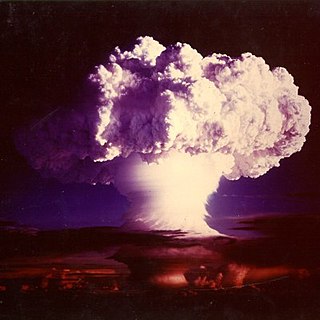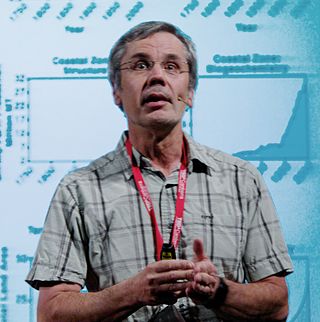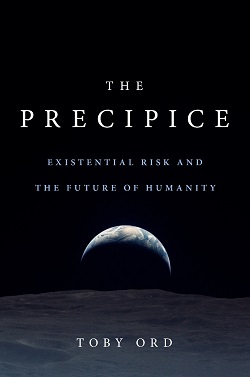Related Research Articles
The carrying capacity of an environment is the maximum population size of a biological species that can be sustained by that specific environment, given the food, habitat, water, and other resources available. The carrying capacity is defined as the environment's maximal load, which in population ecology corresponds to the population equilibrium, when the number of deaths in a population equals the number of births. Carrying capacity of the environment implies that the resources extraction is not above the rate of regeneration of the resources and the wastes generated are within the assimilating capacity of the environment. The effect of carrying capacity on population dynamics is modelled with a logistic function. Carrying capacity is applied to the maximum population an environment can support in ecology, agriculture and fisheries. The term carrying capacity has been applied to a few different processes in the past before finally being applied to population limits in the 1950s. The notion of carrying capacity for humans is covered by the notion of sustainable population.

The Limits to Growth (LTG) is a 1972 report that discussed the possibility of exponential economic and population growth with finite supply of resources, studied by computer simulation. The study used the World3 computer model to simulate the consequence of interactions between the Earth and human systems. The model was based on the work of Jay Forrester of MIT, as described in his book World Dynamics.

Paul Ralph Ehrlich is an American biologist known for his predictions and warnings about the consequences of population growth, including famine and resource depletion. Ehrlich is the Bing Professor Emeritus of Population Studies of the Department of Biology of Stanford University.

Space and survival is the idea that the long-term survival of the human species and technological civilization requires the building of a spacefaring civilization that utilizes the resources of outer space, and that not doing this might lead to human extinction. A related observation is that the window of opportunity for doing this may be limited due to the decreasing amount of surplus resources that will be available over time as a result of an ever-growing population.

Human extinction or omnicide is the hypothetical end of the human species, either by population decline due to extraneous natural causes, such as an asteroid impact or large-scale volcanism, or via anthropogenic destruction (self-extinction), for example by sub-replacement fertility.
Technogaianism is a bright green environmentalist stance of active support for the research, development and use of emerging and future technologies to help restore Earth's environment. Technogaianists argue that developing safe, clean, alternative technology should be an important goal of environmentalists and environmentalism.

Our Final Hour is a 2003 book by the British Astronomer Royal Sir Martin Rees. The full title of the book is Our Final Hour: A Scientist's Warning: How Terror, Error, and Environmental Disaster Threaten Humankind's Future In This Century—On Earth and Beyond. It was published in the United Kingdom under the title Our Final Century: Will the Human Race Survive the Twenty-first Century?.
Human overpopulation is the idea that human populations may become too large to be sustained by their environment or resources in the long term. The topic is usually discussed in the context of world population, though it may concern individual nations, regions, and cities.

The Future of Humanity Institute (FHI) was an interdisciplinary research centre at the University of Oxford investigating big-picture questions about humanity and its prospects. It was founded in 2005 as part of the Faculty of Philosophy and the Oxford Martin School. Its director was philosopher Nick Bostrom, and its research staff included futurist Anders Sandberg and Giving What We Can founder Toby Ord.

A nuclear holocaust, also known as a nuclear apocalypse, nuclear annihilation, nuclear armageddon, or atomic holocaust, is a theoretical scenario where the mass detonation of nuclear weapons causes widespread destruction and radioactive fallout. Such a scenario envisages large parts of the Earth becoming uninhabitable due to the effects of nuclear warfare, potentially causing the collapse of civilization, the extinction of humanity, and/or the termination of most biological life on Earth.

A global catastrophic risk or a doomsday scenario is a hypothetical event that could damage human well-being on a global scale, even endangering or destroying modern civilization. An event that could cause human extinction or permanently and drastically curtail humanity's existence or potential is known as an "existential risk".

Planetary boundaries are a framework to describe limits to the impacts of human activities on the Earth system. Beyond these limits, the environment may not be able to self-regulate anymore. This would mean the Earth system would leave the period of stability of the Holocene, in which human society developed. The framework is based on scientific evidence that human actions, especially those of industrialized societies since the Industrial Revolution, have become the main driver of global environmental change. According to the framework, "transgressing one or more planetary boundaries may be deleterious or even catastrophic due to the risk of crossing thresholds that will trigger non-linear, abrupt environmental change within continental-scale to planetary-scale systems."

William Lee Steffen was an American-born Australian chemist. He was the executive director of the Australian National University (ANU) Climate Change Institute and a member of the Australian Climate Commission until its dissolution in September 2013. From 1998 to 2004, he was the executive director of the International Geosphere-Biosphere Programme, a coordinating body of national environmental change organisations based in Stockholm. Steffen was one of the founding climate councillors of the Climate Council, with whom he frequently co-authored reports, and spoke in the media on issues relating to climate change and renewable energy.

Johan Rockström is a Swedish scientist, internationally recognized for his work on global sustainability issues. He is joint director of the Potsdam Institute for Climate Impact Research (PIK) in Germany, together with economist Ottmar Edenhofer. Rockström is also chief scientist at Conservation International. He is Professor in Earth System Science at the University of Potsdam and Professor in Water Systems and Global Sustainability, Stockholm University.
The Centre for the Study of Existential Risk (CSER) is a research centre at the University of Cambridge, intended to study possible extinction-level threats posed by present or future technology. The co-founders of the centre are Huw Price, Martin Rees and Jaan Tallinn.
Millennium Alliance for Humanity and the Biosphere is an organization originated at Stanford University which focuses on the creation of a new paradigm by the use of foresight intelligence to systematically examine likely and possible futures so as to determine what behavioral and institutional changes are necessary to ensure a sustainable and equitable future for all.

The Precipice: Existential Risk and the Future of Humanity is a 2020 non-fiction book by the Australian philosopher Toby Ord, a senior research fellow at the Future of Humanity Institute in Oxford. It argues that humanity faces unprecedented risks over the next few centuries and examines the moral significance of safeguarding humanity's future.

End Times: A Brief Guide to the End of the World is a 2019 non-fiction book by journalist Bryan Walsh. The book discusses various risks of human extinction, including asteroids, volcanoes, nuclear war, global warming, pathogens, biotech, AI, and extraterrestrial intelligence. The book includes interviews with astronomers, anthropologists, biologists, climatologists, geologists, and other scholars. The book advocates strongly for greater action.

Scenarios in which a global catastrophic risk creates harm have been widely discussed. Some sources of catastrophic risk are anthropogenic, such as global warming, environmental degradation, and nuclear war. Others are non-anthropogenic or natural, such as meteor impacts or supervolcanoes. The impact of these scenarios can vary widely, depending on the cause and the severity of the event, ranging from temporary economic disruption to human extinction. Many societal collapses have already happened throughout human history.

Food or War is a 2019 book by British-Australian science writer Julian Cribb published by Cambridge University Press. The book discusses the central role of food in global stability, arguing that the modern food system, if unchecked, risks precipitating widespread conflict due to its unsustainable practices. Cribb proposes a reimagined food system that harnesses human creativity and technological innovation to secure a renewable, diverse, and safe food supply, thereby promoting global peace.
References
- 1 2 3 4 "Sustaining a Future". www.abc.net.au.
- ↑ "Julian Cribb AM FRSA FTSE" (PDF).
- ↑ "Julian Cribb - Surviving the 21st Century - Unstress with Dr Ron Ehrlich". 2020-05-18.
- ↑ "About". Surviving C21. 2017-03-22.
- ↑ "Canberra Conversations Julian Cribb - ABC Canberra - Australian Broadcasting Corporation". Archived from the original on 30 October 2011.
- ↑ A World Plan of Action for Human Survival
- ↑ "Interview: Humanity's End Game". www.vision.org.
- ↑ "Industrialized food production is 'a very foolish system', says author".
- ↑ Frey, Dr Sibylle (2023-08-24). "Why We Need an Earth System Treaty-A MAHB Dialogue with Julian Cribb, Council for the Human Future". MAHB.